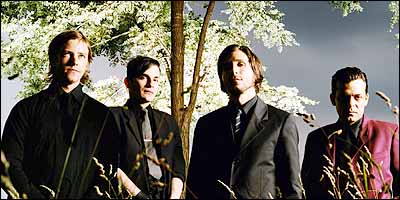
Interpol is so routinely derided as derivative by music critics that a Website offering a list of “101 Bands to Which You Can Compare Interpol Besides Joy Division” just barely seems satirical. But while its name sounds suspiciously like a Joy Division song (“Interzone”), Interpol actually has little in common with the iconic Mancunian band’s industrial-sounding post-punk. In fact, Joy Division’s tetchy, paranoid, percussive aesthetic stands in stark contrast to Interpol’s lush, echoing guitar sound and melodramatic lyrics, exemplified by lead singer Paul Banks’s moaning “Stella! Stella-uh!” on the band’s 2002 debut, Turn On the Bright Lights.
It’s a musical framework that froze into formula on much of Turn On, and the band members’ look (creepers on their feet, angular haircuts) made them seem slavishly retro. Like the teddy boys, a purist British youth subculture that emerged in the fifties, disdaining all but rock progenitors like Gene Vincent, Interpol and its fans believe fervently that music begins and ends with bands like the Smiths or Echo and the Bunnymen.
“Interpol believes that music begins and ends with bands like the Smiths or Echo and the Bunnymen.”
Interpol’s new album, Antics, drowns in the same sort of eighties-era emotionalism of Turn On, but it’s a lot less monotone than its predecessor. Lead singer Banks has traded his toneless, dark singing style for a scratchy, emotive whisper, and the band’s sound is more open and melodic, a welcome change over the forced, fitful stops and starts of Turn On.
There are flashes of the older, more rote Interpol on Antics (the dull drone and clichéd small-town boredom of “No Exit”), but its best songs—particularly the fevered romanticism of “Evil”—provide the record with the easy, effortless momentum of great pop. Yet the idealized love songs of Antics—“You should be in my space / you should be in my life,” Banks sings on “Narc”—feel bloodless. And during a cultural moment that demands not necessarily protest music but some kind of relevance or engagement with the world, Interpol’s music seems too much like a retreat. The band’s cocoon of maudlin love should be enough, but it’s hard to get truly lost when the world’s woes keep tracking you down.
What transformed Elvis Costello, who once possessed a bilious songwriting style and an acidic sneer of a voice, into a caricature of pompous, “literate” rock? Was it the reissues of mediocre records like Kojak Variety, the 100th breathless review of his work from Greil Marcus, the high-culture collaborations with the Mingus Orchestra, or, perhaps, a concert at Lincoln Center devoted to his oeuvre?
Costello’s new album, The Delivery Man, his first with the backup band the Imposters since 2002 and his debut with the country label Lost Highway, doesn’t help in pinpointing the moment Costello veered into self-parody, but it does catalogue nearly everything that’s become impossible to take about him: the overly dense, nonsensical wordplay of “Country Darkness,” the exhausted songwriting subjects (the false messiahs of “Delivery Man”), and the cartoonish warbles of “Button My Lip.”
The Delivery Man was inspired by Johnny Cash, according to Costello, but it’s hard to see how the plainspokenness of the late country singer has anything to do with his preening sensibility. In interviews, Costello conflates criticism of his varied directions with a stifling of artistic ambition. But if he has every right to experiment with classical, country, and everything in between, his audience is just as free to reject his smothering of those genres with the incessant wordplay of an undergrad paging through a thesaurus.